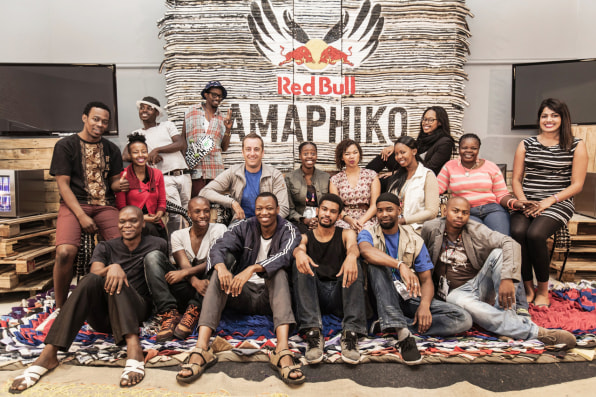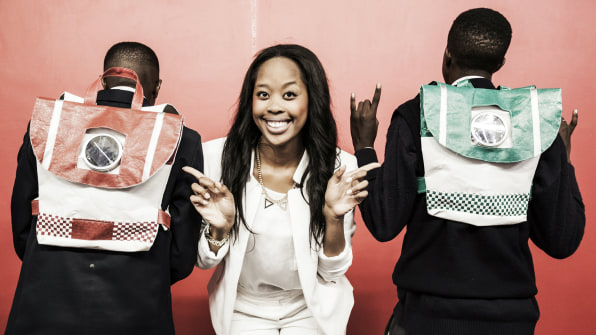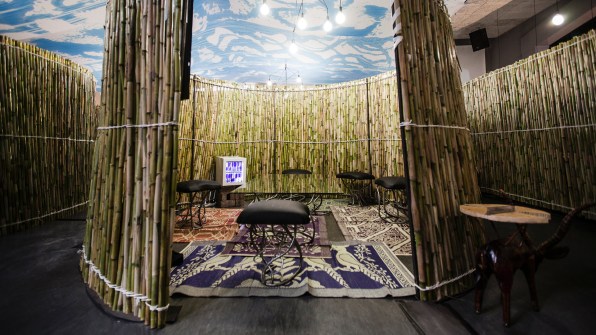How To Draw A Red Bull Can
As a college student in Johannesburg, South Africa, Thato Kgatlhanye, thought up a clever product to improve both the environment and the lives of school-age children living in the struggling, largely rural communities that surrounded her: a backpack made of recycled plastic bags with a solar-charged light attached. The bag itself would reduce waste and trash heaps in the region. At night, the light could act like a lantern allowing kids without electricity to continue studying after dark.
Shortly after graduating, the 21-year-old dreamer ran into a classic problem with that kind of blue-sky thinking: Making the product both quickly and cost-effectively was tough. Finding investors willing to help her was even tougher. So in 2014, with little more than a prototype in hand, Kgatlhanye applied to Red Bull's inaugural Red Bull Amaphiko Academy, in the township of Soweto.

In the three years since, her product, Repurpose Schoolbags, has been tweeted about by Bill Gates, who gave it another nod in July 2016 when he delivered the Nelson Mandela Annual Lecture at the University of Pretoria. After her company, called Rethaka, scaled up its manufacturing process, companies like Unilever, the data analytics firm Epsilon, and Coca-Cola began purchasing them to donate to schools across sub-Saharan Africa. So far, the company has sold 10,000 bags and expects to double sales this year. They're looking to partner with NGOs to expand their purchasing and distribution network, and plan to debut a more upscale model for a buy-one, give-one initiative patterned after Toms shoes in September.

Kgatlhanye considers Red Bull's grassroots-directed incubator to be a huge reason for her success. "It was quite audacious to go into the academy and say, 'We just have a product,'" she says. But unlike traditional incubators, many of which press for immediate ways to monetize or scale, she received the sort of basic business coaching, inspiration, and connections to other entrepreneurs that many young company owners lack. The result was "an environment where the vision of what your idea can be is respected and more important than the stage of the business" or whatever growth cycle you're in, she says.
As you can see in the video below, it also led to a better understanding about how she should market her product, in the way that ultimately caught Gates's attention. The packs aren't just cool tools, they're sustainable resources that help those in the developing world fulfill potential.
The Amaphiko Academy has since expanded to Brazil, and the company is currently accepting applicants for the first U.S. division, which it launched in partnership with Ashoka and Impact Hub Baltimore. That program, which will occur this August, features a 10-day residency for 15 to 20 participants who will get a chance to network and learn from yet-to-be-announced industry thought leaders. That's followed by an 18-month development program, where each person or company is matched with a mentor to refine their venture in a way that will help them secure more grants or investment. There's also an online community component, in which investors or collaborators can review projects that they might want to back or join.
Amaphiko is Zulu for "wings," a play on the highly caffeinated beverage's famous tagline ("Red Bull gives you wings"). That's because the academy started in South Africa after company team members decided that, in addition to their usual set of ambassadors, who were mostly musicians or extreme athletes, the brand might want to sponsor those trying to directly uplift people's quality of life as social entrepreneurs.
Since launching in 1987, the estimated $7.9 billion energy drink company has backed an eclectic mix of young talent and hip events to become a lifestyle brand for millennials—even those doing far less extreme feats, like staying up all night coding, or working on their PowerPoints. What the branded business boot camps represent then, is that building socially conscious companies might now be just as cool an undertaking as Felix Baumgartner's BASE jump from the stratosphere.

"Whatever it might be–jumping from outer space, being shot out of a cannon–they are kind of saying social entrepreneurs are the same kind of person for taking on something incredibly challenging and putting their personal passion into it," says Michelle Geiss, the cofounder and executive director of Impact Hub Baltimore. "In many ways, this is along the same kind of support [the company] is already giving people." Except Baumgartner's space jump required a specialized helium balloon and spacesuit. Academies–with no immediate cash reward–would seem far less expensive.
As the Amaphiko Academy marketing video shows, the sales pitch can certainly be amped up to feel equally sporty and aspirational.
For each academy, the hope is to groom entrepreneurs who are already familiar with their own community's needs. "These don't need to be high-tech startups–it could be someone who started a community center to teach young people to dance," says Geiss, who adds that one recent Baltimore applicant has a plan to teach STEM classes through lessons with dirt bikes. "What I'm hoping is that social entrepreneurs who might not even call themselves that can see where this might fit into their work and go for it."
A total of 64 people have graduated from these fledgling programs, about 70% of which are running businesses with sustainable revenue and social impacts. That includes Lady Liberty, a South African group that provides mobile legal services pro bono to poor and marginalized women, and Fix Forward, a group that connects homeowners and businesses with qualified local trade workers, who might otherwise have trouble finding work.
For her part, Kgatlhanye says the 10-day academy provided important coaching on how to think like an entrepreneur, including lessons from Andy Walshe, Red Bull's high performance director, who organizes stunts and trains athletes to push past their limits, often with techniques that give them a mental edge. Walshe worked closely with Baumgartner before he chucked himself into outer space. At the Amaphiko Academy, he taught entrepreneurs similar mind-over-matter techniques for taking a smart business leap. Kgatlhanye left with new habits to "win-the-day every day," she says, including the ability to perceive every problem as a new insight into how the rest of the company might operate more effectively.
Kgatlhanye also made business connections that helped her refine production and smartly recruit a workforce of more than 20 people, all of whom are similarly driven millennials. Currently, she shares office space alongside another entrepreneur she met during the program, and continues to rely on the group's network for gut checks. "It's very easy to blur the lines between being a business that is socially aware and being a business that has scalability," she says. "That balance is very important. Entrepreneurship is certainly a ruthless game, as you can imagine. To survive is one thing, but to thrive is another."
How To Draw A Red Bull Can
Source: https://www.fastcompany.com/3069186/can-red-bull-make-social-entrepreneurship-an-extreme-sport
Posted by: martinezdiente.blogspot.com

0 Response to "How To Draw A Red Bull Can"
Post a Comment